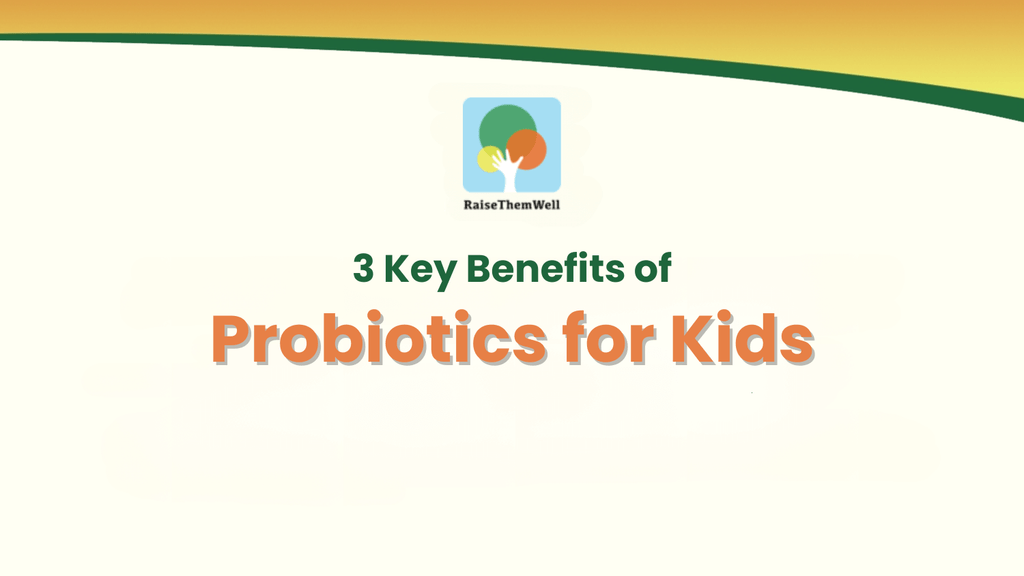What Do Probiotics Do For Kids?
Probiotics are beneficial microorganisms that can help maintain or restore the natural balance of bacteria in the gut. For children, this balance is crucial for overall health, digestion, and immune function. Here’s a closer look at how probiotics can benefit kids.
Restoring the Natural Balance
The gut is home to trillions of bacteria, which play essential roles in digestion, nutrient absorption, and immune system function. An imbalance in these bacteria - often caused by external factors - can lead to digestive issues, weakened immunity, and other health problems. Probiotic supplements can help restore this balance[1,2] by:
1. Replenishing Good Bacteria:
Probiotics introduce beneficial bacteria into the gut, helping to outcompete harmful bacteria and restore a healthy microbial balance.
2. Enhancing Digestive Health:
By improving the balance of gut bacteria, probiotics can aid in digestion and reduce issues associated with poor gut health like constipation[3,4], diarrhea[5-7], and bloating[8].
3. Boosting Immune Function:
A healthy gut microbiome supports the immune system[9,10], making it more effective at fighting off infections and diseases.

Factors Disrupting Gut Bacteria
Several factors can disrupt the natural balance of gut bacteria in children, making the intake of probiotics especially important:
1. Antibiotics:
While necessary (although often overused) for treating bacterial infections, antibiotics can also kill beneficial bacteria in the gut, allowing bad bacteria to flourish, which can result in antibiotic-associated diarrhea.
2. Chlorine in Drinking Water:
Chlorine is used to disinfect water but can also affect the gut microbiome by reducing the population of beneficial bacteria. If your child is drinking regular tap water, then they likely need probiotics.
3. Environmental Toxins:
Exposure to various toxins in the environment, including pesticides (especially glyphosate which is nearly impossible to avoid in our American food) and pollutants, can negatively impact gut health.
4. Stress:
Stress, both physical and emotional, can alter the gut microbiome, leading to digestive issues and weakened immunity.
Health Benefits of Probiotics for Kids
Given these disruptions, many parents are turning to probiotics to support their child's gut health. Probiotics can:
- Mitigate the Impact of Antibiotics: By replenishing good bacteria after a course of antibiotics, probiotics can help proactively restore gut health.[11]
- Combat Environmental Toxins: Regular intake of probiotics can help maintain a robust gut microbiome, offering some protection against the negative effects of environmental toxins including chlorine and glyphosate.[12]
- Reduce Stress-Related Gut Issues: Probiotics can help manage the gut-brain connection, potentially reducing stress-related digestive problems.[13-15]
In summary, probiotics play a crucial role in maintaining and restoring the natural balance of gut bacteria in children. They help mitigate the adverse effects of antibiotics, chlorine, environmental toxins, and stress, promoting better digestive health and a stronger immune system. This is why so many parents are incorporating probiotic supplements into their children's daily routine.
Looking for a kids’ daily probiotic from a brand you can trust?

Raise Them Well’s Children’s Chewable Probiotic is physician-formulated specifically for kids with a spore-based probiotic complex blend that provides improved transport through the digestive system.

Our kids’ daily probiotic is:
- Potent: Providing 5 billion CFUs of healthy bacteria per tablet
- Allergy-Friendly: Dairy-free, soy-free, gluten-free
- Free of Artificial Additives: No artificial flavors, sweeteners, preservatives, or bio-engineered ingredients
- Great-Tasting: Kids love the natural mixed berry flavor of our easy-to-chew tablets
Additional Information About Probiotics for Kids:
How Prebiotics and Probiotics Work
How to Choose Probiotics for Kids: 7 Tips to Help Parents Make the Best Choice
References:
- Hojsak, I. (2017). Probiotics in children: what is the evidence?. Pediatric gastroenterology, hepatology & nutrition, 20(3), 139-146.
- Kligler, B., Hanaway, P., & Cohrssen, A. (2007). Probiotics in children. Pediatric Clinics of North America, 54(6), 949-967.
- Wojtyniak, K., & Szajewska, H. (2017). Systematic review: probiotics for functional constipation in children. European journal of pediatrics, 176, 1155-1162.
- Huang, R., & Hu, J. (2017). Positive effect of probiotics on constipation in children: a systematic review and meta-analysis of six randomized controlled trials. Frontiers in cellular and infection microbiology, 7, 153.
- Mandal, A., & Sahi, P. K. (2017). Probiotics for diarrhea in children. Journal of Medical Research and Innovation, 1(2), AV5-AV12.
- Guandalini, S. (2008). Probiotics for children with diarrhea: an update. Journal of clinical gastroenterology, 42, S53-S57.
- Guandalini, S. (2011). Probiotics for prevention and treatment of diarrhea. Journal of clinical gastroenterology, 45, S149-S153.
- Wegh, C. A., Benninga, M. A., & Tabbers, M. M. (2018). Effectiveness of probiotics in children with functional abdominal pain disorders and functional constipation: a systematic review. Journal of clinical gastroenterology, 52, S10-S26.
- Sanidad, K. Z., & Zeng, M. Y. (2020). Neonatal gut microbiome and immunity. Current opinion in microbiology, 56, 30-37.
- Cresci, G. A., & Bawden, E. (2015). Gut microbiome: what we do and don't know. Nutrition in Clinical Practice, 30(6), 734-746.
- Mantegazza, C., Molinari, P., D’Auria, E., Sonnino, M., Morelli, L., & Zuccotti, G. V. (2018). Probiotics and antibiotic-associated diarrhea in children: A review and new evidence on Lactobacillus rhamnosus GG during and after antibiotic treatment. Pharmacological research, 128, 63-72.
- Feng, P., Ye, Z., Kakade, A., Virk, A. K., Li, X., & Liu, P. (2018). A review on gut remediation of selected environmental contaminants: possible roles of probiotics and gut microbiota. Nutrients, 11(1), 22.

